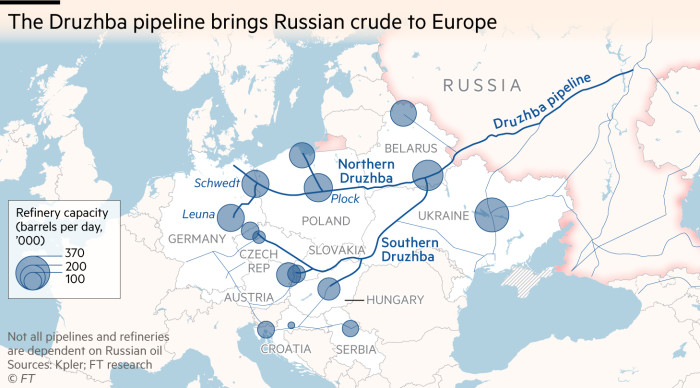
Russian oil flow halted through Druzhba pipeline to central Europe
The flow of oil along a key pipeline transporting Russian crude to central Europe has been halted amid a row over payments, threatening supplies to the region and exposing the EU’s continued reliance on Russian imports.
The southern branch of the Druzhba pipeline, which takes Russian oil across Ukraine to refineries in Slovakia, the Czech Republic and Hungary, stopped pumping five days ago, Russia’s state-owned pipeline operator Transneft said in a statement on Tuesday.
According to Transneft, Ukraine cut off the flow after a payment for transit fees was blocked because of problems related to the implementation of EU sanctions. The Russian company pays Ukraine’s state-owned UkrTransNafta a monthly fee in advance to use the pipeline, worth about $15mn last month.
Transneft said the European banks that process the payment had not received the required approval this time, claiming that EU regulators “have yet to form a common position” on how or whether the banks should allow the transactions.
The EU has banned transactions involving Russian state-owned entities, including Transneft, although this does not apply to the import or transport of oil and gas into the bloc. An EU official said the European Commission was looking into the issue but declined to comment further.
Naftogaz, owner of UkrTransNafta, also declined to comment.

The shutdown exposes the continued dependence of central Europe on the pipeline, just as the rest of the continent is seeking to reduce its dependence on Russian oil. TransPetrol, which operates the section of the Druzhba pipeline that runs through Slovakia, also confirmed that flows had stopped.
Hungary, Slovakia and the Czech Republic imported an average of 318,000 barrels per day of crude via the Druzhba last month alone, up from 246,000 b/d in July last year, according to data provider Kpler. The transit fees Transneft must pay to Ukraine are roughly $1.61 per barrel, Kpler added.
Viktor Katona, a Kpler analyst, said the shutdown was a major problem for Slovakia and the Czech Republic in particular. “If the pipeline volumes do not come back in a relatively short period of time — I’m talking days not weeks — then they’re out stocks,” he said.
Jozef Síkela, minister of industry and trade in the Czech Republic, said his government was working with “all the relevant actors” to resolve the situation. “The next few days will show whether this is another escalation of the energy war by Russia or a technical problem in payments,” he said.
Russia has previously been accused of purposely cutting energy exports to Europe to pressure the EU to ease its economic sanctions.
Moscow claimed last week that it had been forced to limit gas deliveries to northern Europe via the Nord Stream 1 pipeline because western sanctions had blocked the delivery of a key turbine.
The Kremlin has also said the sanctions against it hurt the EU more than Russia by limiting the bloc’s access to energy.
“European countries that are trying to punish Russia are actively paying the bills for it,” Dmitry Peskov, President Vladimir Putin’s spokesperson, said on Tuesday, according to Interfax. Peskov also hinted that EU nations would eventually question whether supporting Ukraine was worth the hit to their economies.
MOL, which operates the Hungarian section of the pipeline and whose refineries rely on supplies from Druzhba, said it had “several weeks” of oil reserves that it could use if needed.
It also said it was working on a solution, including possibly paying the Ukrainian transit fees itself.
The Druzhba pipeline has been a central feature of the European energy infrastructure since it was opened in 1964 as a way for the Soviet Union to supply its allies in the Communist bloc.
Its importance is such that imports via the pipeline will be exempt from an EU ban on bringing Russian oil into the bloc, which comes into full effect in December.
Brent crude, the international benchmark, rose as much as 1.8 per cent on Tuesday to $98.40 per barrel before declining slightly.
The northern leg of the Druzhba pipeline, which runs through Belarus to Poland and Germany, has not been affected by the stoppage.
Additional reporting by Roman Olearchyk in Kyiv and Alice Hancock in Brussels
Stay connected with us on social media platform for instant update click here to join our Twitter, & Facebook
We are now on Telegram. Click here to join our channel (@TechiUpdate) and stay updated with the latest Technology headlines.
For all the latest Education News Click Here
For the latest news and updates, follow us on Google News.

